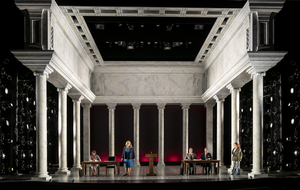Review: ROE at Goodman Theatre

Lisa Loomer's ROE offers a timely exploration of the history behind the 1973 Supreme Court case Roe v. Wade and the ongoing political debate around abortion and a women's right to choose. While Loomer's text is not necessarily nuanced in the way that it presents the argument around abortion, ROE does consider both sides of this divisive issue. The play is perhaps most compelling in its capacity to pull back the curtain around the original Roe v. Wade case and reveal the case's history. ROE centers on two critical women, the lawyer Sarah Weddington, who was only in her mid-twenties when she brought this case before the Court, and Norma McCorvey, the plaintiff under the pseudonym "Jane Roe." Before I saw this play, I had never heard these women's names before. But now, thanks to Loomer's work, I won't soon forget them. For Loomer interestingly not only presents both sides of the United States' debate over a woman's right to choose but also puts forth Sarah and Norma's two differing perspectives on the events that transpired before and after Roe v. Wade was decided.
Loomer envisions this duality of perspectives in an inherently theatrical manner, and Vanessa Stalling's staging suits the heightened nature of the script. Sarah (Christina Hall) and Norma (Kate Middleton) often engage in direct address with the audience and also engage in frequent debates on stage. Stalling makes interesting use of the Goodman's spacious Albert Theatre stage to create stark contrasts between public and private spaces. Collette Pollard's set is flanked by giant pillars suggesting the majesty of the Supreme Court, while several more intimate set pieces are rolled onto the stage. The design mirrors the precise debate at the center of ROE: Who should have the right to decide what a woman can do with her body? Is the right to an abortion ultimately a public or a private matter?
The theatrical device of having Sarah and Norma debate one another is engaging and creative. While these women did not have this same opportunity in real life, Loomer uses this as an opportunity to illuminate their points of view. The play presents that Roe v. Wade had its origins in a pizza parlor in Texas, where Sarah, Norma, and attorney Linda Coffee (Meg Walker) met for the first time. Even from this initial meeting, Sarah and Norma have quite different recollections. Sarah was seeking a young woman to be the face of the case, while Norma was a 22-year-old woman pregnant for the third time and seeking an abortion. The play asks us to consider whether Sarah took advantage of the decidedly less privileged Norma in order to make her case, and as a result, considers whether it is exploitative to do so in the name of securing the right to choose for women across America.
This tension would not succeed without capable actors in these roles, and the performances in ROE are across-the-board excellent. Hall has an authoritative presence as Sarah, showcasing her character's desire to fight for women's rights and also to advocate for herself in a time period in which few women were granted the right to practice law. Middleton infuses her portrayal of Norma with humor and warmth, while also making clear the gravity of her character's situation. She also convincingly transitions as Norma ages throughout the play-and as her opinions on abortion become radically different. While the play's subject matter is serious, Walker is a hilarious scene stealer as the awkward Linda Coffee. She plays the character with integrity and fully owns Linda's quirkiness. Stephanie Diaz is lovely as Norma's partner Connie, one of the most generous and kind-hearted people that Norma meets-even as many around her aim to take advantage. Ryan Kitley is utterly convincing as Flip Benham, the head of the anti-abortion organization Operation Rescue who ultimately persuades Norma to change her mind on the issue at hand. In terms of the play's structure, this also deepens the theme about taking advantage of one individual to prove a point on behalf of many.
While Loomer's script undoubtedly endorses a woman's right to choose and make decisions about her own body, the play does present characters on both sides of the abortion debate itself. It's hard to avoid becoming didactic in plays like these, and ROE does not entirely escape that fate. The first act is tightly structured and captivating as the Supreme Court case unfolds, but it loses some steam in the second-which focuses wholly on events occurring after the case. The play meanders somewhat without the framework of the case itself, and it ends with a town hall debate that is too square of a conclusion.
While ROE may not be the most nuanced in its discussion of the central issue, it presents a fascinating portrait of the two women at the center of the case and serves as an important reminder that history lives in the hands of real, flawed people. And with political debate surrounding women's access to reproductive rights of all kinds once again swirling, the Goodman could not be producing ROE at a better moment.
ROE plays Goodman Theatre's Albert Theatre, 170 North Dearborn, through February 23. Tickets are $20-$70. Visit GoodmanTheatre.org or call 312.443.3800.
Photo Credit: Liz Lauren
Review by Rachel Weinberg
Reader Reviews

Videos

